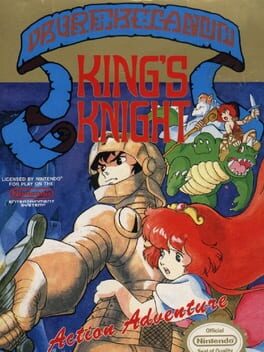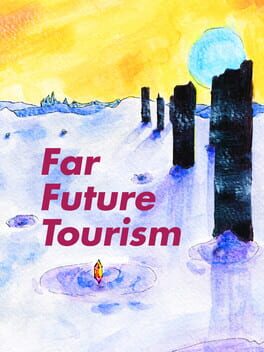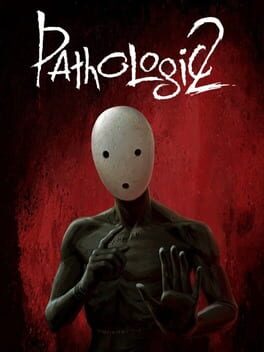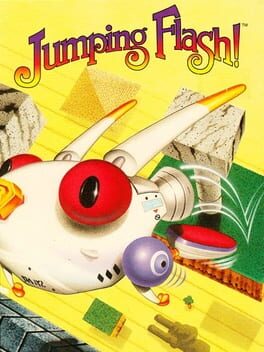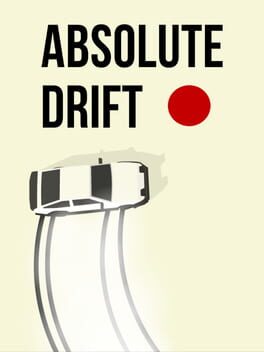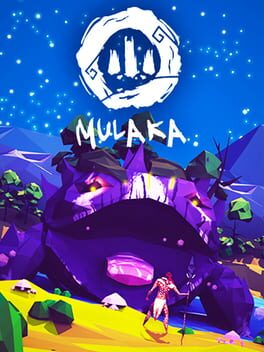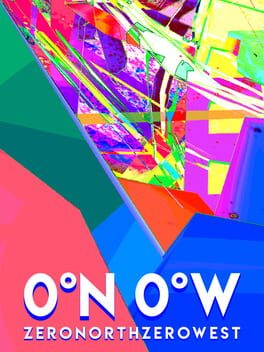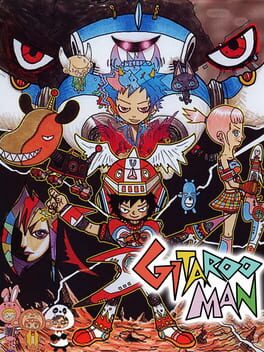2418 Reviews liked by Ardwyw_mp3
King's Knight
1986
This game is weird for me, cuz the core gameplay loop is really good, but to actually complete the game you have to go through a bunch of cryptic arbitrary NES era BS. When viewed as a game to beat, it kinda sucks, but when viewed just as a game to be played it's frantic projectile dodging while you try and carve your way through the levels with a few hiccups and oddities along the way.
God Hand
2006
The biggest stain on the integrity of videogame journalism and the the most beloved unplayed gem in every single gamer's backlog. Being what's probably the only direct translation of the beat 'em up genre into the 3D realm worth playing and talking about, God Hand is one of the most uncompromised and unique entries in the combo oriented pantheon of action games. Incredible that I'm saying this about the game that shutdown any chances of Mikami ever being able to fully go off ever again.
The stiff and constricted movement controls in God Hand force the player to be aware of every surrounding enemy and pick each fight wisely, while still allowing direct confrontation and proximity through a dynamic and anime as fuck dodge system that has you bobbing and weaving between flurry of punches before delivering an uppercut. Expanding on Resident Evil 4's dynamic difficulty, God Hand increases it's challenge the better you get at it, which while being a make or break for some folks out there, makes it stand out from the standard difficulty options from other games and provides immediate feedback to the player on how better he is getting at the game.
God Hand ditches out combo memorization in favor of an easy to understand set of options that reveal their complexity through their success on parrying, guard breaking, stunning or tripping the enemy, which varies depending on who you dealing with it at that moment, and instead let's players express themselves by allowing them to choose their own sequence of combos to perform from a vast list of Bruce Lee like moves that, if set up properly, will have your enemies all flying into a concrete wall at mach speed from one single twirling kick.
Framing all of this insane action is one of the most out there and bizarre universes ever seen. God Hand wears it's 80s/90s action anime influences on it's sleeve, but even if you have gotten familiar with Jojo's Bizarre Adventure these past years, you will still have a hard time making sense of the design and personalities of some of the enemies and bosses in here. God Hand takes the aesthetic of 2D beat 'em ups and just amps it up to 11, clearly having no interest or care for consistent and well thought out world building and presentation, and going for a humorous and visionless dumb as fuck story.
Which is awesome, because what other game has you fighting a wrestling Gorilla that chases bananas mid combat, sparring against a fat Elvis mexican impersonator, or spanking a succubus that turns you into a dog, all in the span of a few hours?
The stiff and constricted movement controls in God Hand force the player to be aware of every surrounding enemy and pick each fight wisely, while still allowing direct confrontation and proximity through a dynamic and anime as fuck dodge system that has you bobbing and weaving between flurry of punches before delivering an uppercut. Expanding on Resident Evil 4's dynamic difficulty, God Hand increases it's challenge the better you get at it, which while being a make or break for some folks out there, makes it stand out from the standard difficulty options from other games and provides immediate feedback to the player on how better he is getting at the game.
God Hand ditches out combo memorization in favor of an easy to understand set of options that reveal their complexity through their success on parrying, guard breaking, stunning or tripping the enemy, which varies depending on who you dealing with it at that moment, and instead let's players express themselves by allowing them to choose their own sequence of combos to perform from a vast list of Bruce Lee like moves that, if set up properly, will have your enemies all flying into a concrete wall at mach speed from one single twirling kick.
Framing all of this insane action is one of the most out there and bizarre universes ever seen. God Hand wears it's 80s/90s action anime influences on it's sleeve, but even if you have gotten familiar with Jojo's Bizarre Adventure these past years, you will still have a hard time making sense of the design and personalities of some of the enemies and bosses in here. God Hand takes the aesthetic of 2D beat 'em ups and just amps it up to 11, clearly having no interest or care for consistent and well thought out world building and presentation, and going for a humorous and visionless dumb as fuck story.
Which is awesome, because what other game has you fighting a wrestling Gorilla that chases bananas mid combat, sparring against a fat Elvis mexican impersonator, or spanking a succubus that turns you into a dog, all in the span of a few hours?
Far Future Tourism
2017
Connor Sherlock is a master moodbuilder, and his collection of worlds leverages the most basic elements — color, space, scale, sound — to completely possess you. Brief text files frame your visits as ‘far future tourism’, but there’s this constant sense that you’re not supposed to be there. They’re not for you. You’re trespassing on the universe. You encounter abandoned megastructures, but they’re monuments without referents, full of dead intentions, unreadable but still somehow feelable. Yet not in a way that draws you closer. They remain alien and inscrutable but also specific, gesturing not at something generic or universal but exact and absolute and final. The only gods left here are Wonder and her sister Horror. The rest is silence.
So you walk. What else is there to do? The universe is vast and the best way to really feel that is to walk it. Walking Simulator A Month Club Vol. 1 takes that old open world cliche — see that in the distance, you can go there! — and reaffirms its natural power. To see there from here. And then here from there. These worlds answer important questions like: what’s it like on the far side of a megalith? What’s the end of the day like for an alien archive? How big, how far away is that strange silhouette really? Everything works together — the light, palette, texture, depth of field, movement speed, the stunning score — to answer these elemental questions. Are you lost? Overwhelmed? The music will tell you what to do.
Here’s an interstellar nightclub for sentient vapors. Here’s a secret platformer where a superstructure insertion went wrong. Here’s an honest to god dungeon, with choking halls and vast chambers and the buried aqueduct of Leviathan. Here’s an overmined crystal planet just before its death. Delve deep enough and you’ll fall through the bottom, into the wild pink. You’ll visit these worlds pre or post or mid apocalypse. Mind your step among the gassy foothills. Nevermind the shadows of comet debris. Is that a world engine burning below?
This collection of worlds, taken together, is the greatest walking simulator I’ve ever played. It takes a primary complaint against the genre — a lack of interaction — and walks it right off the edge of its worlds. It makes walking feel not like a limitation but an end in itself. Because it understands the walking simulator as ultimately a game of distance and desire. There’s no end to either, no end to the universe. The only question is: how far will you go?
So you walk. What else is there to do? The universe is vast and the best way to really feel that is to walk it. Walking Simulator A Month Club Vol. 1 takes that old open world cliche — see that in the distance, you can go there! — and reaffirms its natural power. To see there from here. And then here from there. These worlds answer important questions like: what’s it like on the far side of a megalith? What’s the end of the day like for an alien archive? How big, how far away is that strange silhouette really? Everything works together — the light, palette, texture, depth of field, movement speed, the stunning score — to answer these elemental questions. Are you lost? Overwhelmed? The music will tell you what to do.
Here’s an interstellar nightclub for sentient vapors. Here’s a secret platformer where a superstructure insertion went wrong. Here’s an honest to god dungeon, with choking halls and vast chambers and the buried aqueduct of Leviathan. Here’s an overmined crystal planet just before its death. Delve deep enough and you’ll fall through the bottom, into the wild pink. You’ll visit these worlds pre or post or mid apocalypse. Mind your step among the gassy foothills. Nevermind the shadows of comet debris. Is that a world engine burning below?
This collection of worlds, taken together, is the greatest walking simulator I’ve ever played. It takes a primary complaint against the genre — a lack of interaction — and walks it right off the edge of its worlds. It makes walking feel not like a limitation but an end in itself. Because it understands the walking simulator as ultimately a game of distance and desire. There’s no end to either, no end to the universe. The only question is: how far will you go?
Dark Souls III
2016
Pathologic 2
2019
Chrome Dino
2014
Jumping Flash!
1995
Absolute Drift
2015
Mulaka
2018
the trilogy seems to want to be a little helpful guide to lgbt issues while avoiding being outright didactic, but for the first time in the three games the dodging here just makes all the "educational" stuff ten times worse. "opening up" always leads to the best outcome, all your friends are understanding and the game basically hand holds you to acceptance, which ends up being another system. well intentioned tho, and good dialogues without forced indieness.
Rain World
2017
Completamente comprometido a su idea de mundo, Rain World renuncia a cualquier tipo de progresión que incite al jugador a volver. No hay mazmorras, no hay bosses, no hay un sistema de niveles ni de construcción ni de mejora de equipamiento. No hay siquiera personajes o una historia. Sólo unas imágenes al principio que señalan al escape de este mundo como puntapié.
Por esto resulta normal leer cosas como "recién al tercer/cuarto intento con este juego pude terminarlo" o "lo dejé al poco tiempo" o "lo retomé por recomendación de tal o cual persona". Esta fue mi experiencia, efectivamente. No fueron pocas las veces que, tras una sesión de juego, terminaba en una situación peor a la que había empezado. No sólo por su sistema de "símbolos", que castiga al jugador por morir repetidamente, sino porque cada vez entendía menos cómo progresar en ese lugar y cuál era verdaderamente mi objetivo. No hay nada a lo que agarrarse, sencillamente. Sólo a la sensación de vida que desprende en el momento a momento.
Esa sensación de vida es todo en Rain World. Como tantos otros juegos que logran este efecto, contrapone constantemente un mundo muerto con criaturas vivas en él. La idea permanentemente presente del "lo que alguna vez fue" con el "cómo sacarle provecho ahora?". Sobrevivir en un mundo que no da las condiciones para la vida.
Y las criaturas presentes no están quietas esperando a que el jugador pase cerca para activarse o moviéndose en un patrón repetido. En cada ciclo muestran un comportamiento creíble. Inteligente pero errático, redefiniendo a cada instante sus objetivos pero chocándose por inercia o por el tonto manejo de sus extremidades. Como nuestro personaje, parecen estar tanto en conflicto con sus alrededores como con su propia anatomía.
Spoilers:
En el desenlace, hasta esa única premisa del juego es subvertida. La idea inicial en Rain World era sobrevivir y escapar de este lugar? El final entonces es en lo más profundo y a la vez un suicidio. Rain World propone el último acto como uno trascendental, la unión física y espiritual de cuerpo y mundo: la muerte más hermosa de la historia de los videojuegos.
Por esto resulta normal leer cosas como "recién al tercer/cuarto intento con este juego pude terminarlo" o "lo dejé al poco tiempo" o "lo retomé por recomendación de tal o cual persona". Esta fue mi experiencia, efectivamente. No fueron pocas las veces que, tras una sesión de juego, terminaba en una situación peor a la que había empezado. No sólo por su sistema de "símbolos", que castiga al jugador por morir repetidamente, sino porque cada vez entendía menos cómo progresar en ese lugar y cuál era verdaderamente mi objetivo. No hay nada a lo que agarrarse, sencillamente. Sólo a la sensación de vida que desprende en el momento a momento.
Esa sensación de vida es todo en Rain World. Como tantos otros juegos que logran este efecto, contrapone constantemente un mundo muerto con criaturas vivas en él. La idea permanentemente presente del "lo que alguna vez fue" con el "cómo sacarle provecho ahora?". Sobrevivir en un mundo que no da las condiciones para la vida.
Y las criaturas presentes no están quietas esperando a que el jugador pase cerca para activarse o moviéndose en un patrón repetido. En cada ciclo muestran un comportamiento creíble. Inteligente pero errático, redefiniendo a cada instante sus objetivos pero chocándose por inercia o por el tonto manejo de sus extremidades. Como nuestro personaje, parecen estar tanto en conflicto con sus alrededores como con su propia anatomía.
Spoilers:
En el desenlace, hasta esa única premisa del juego es subvertida. La idea inicial en Rain World era sobrevivir y escapar de este lugar? El final entonces es en lo más profundo y a la vez un suicidio. Rain World propone el último acto como uno trascendental, la unión física y espiritual de cuerpo y mundo: la muerte más hermosa de la historia de los videojuegos.
0°N 0°W
2018
when taking into account all the flaws and masterstrokes in each game touched by the love-de-lic spirit, their totality making every one of them interesting in their own ways, let it be said that this game is kinda incoherent in how its constituent parts are stitched together. i like chulip more for making the town and its residents the center of the world, and how it feels more grounded of a story. even the ways chulip is a mess are more compelling to me than the ways in which moon is a mess.
that being said, in terms of raw passion of its developers and the heat of the moment in which it was made, moon hasnt been touched. its strange, insular kind of innovation came out of testing the hypothesis that video games must be worth /something/, its developers (a fucking SUPERGROUP of a team) expressing their love for the artform by changing the rules so drastically, to surpass everything holding them back. by changing an RPG into an adventure game, by having the player practice patience with the flow of time to understand others, by having the world's characters all driven by this thematic force that the designers desperately wanted to impart on you as something that must exist both inside AND outside the game, despite what other games in its time would have you believe. its "what if games were nice instead of mean" type message may come off as precious and hokey but i think the history around its development as a console game in 1997, and the genre-ambiguous space it establishes—built on later by other love-de-lic games, chulip, endonesia, nishi-directed games at skip—gives moon this mysterious and captivating aura, as well as a radical sincerity to explore into the core of what games really are and what they could be. the final sequence is incredibly poignant to me with this in mind
basically there is no other game that just...radiates heart as glowingly as moon, you can see it and hear it and read it and feel it. this game is the untold spark of so much, as the root of highly creative game design legacies from the names attached to this project. they can possibly make better games in different settings, but moon only could happen this one time.
that being said, in terms of raw passion of its developers and the heat of the moment in which it was made, moon hasnt been touched. its strange, insular kind of innovation came out of testing the hypothesis that video games must be worth /something/, its developers (a fucking SUPERGROUP of a team) expressing their love for the artform by changing the rules so drastically, to surpass everything holding them back. by changing an RPG into an adventure game, by having the player practice patience with the flow of time to understand others, by having the world's characters all driven by this thematic force that the designers desperately wanted to impart on you as something that must exist both inside AND outside the game, despite what other games in its time would have you believe. its "what if games were nice instead of mean" type message may come off as precious and hokey but i think the history around its development as a console game in 1997, and the genre-ambiguous space it establishes—built on later by other love-de-lic games, chulip, endonesia, nishi-directed games at skip—gives moon this mysterious and captivating aura, as well as a radical sincerity to explore into the core of what games really are and what they could be. the final sequence is incredibly poignant to me with this in mind
basically there is no other game that just...radiates heart as glowingly as moon, you can see it and hear it and read it and feel it. this game is the untold spark of so much, as the root of highly creative game design legacies from the names attached to this project. they can possibly make better games in different settings, but moon only could happen this one time.

